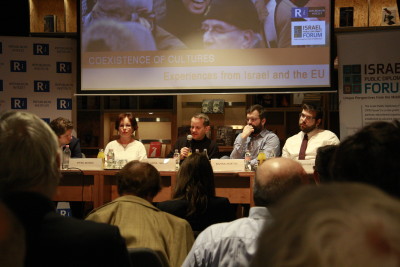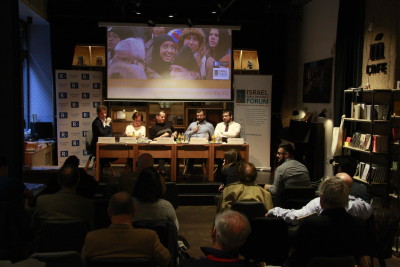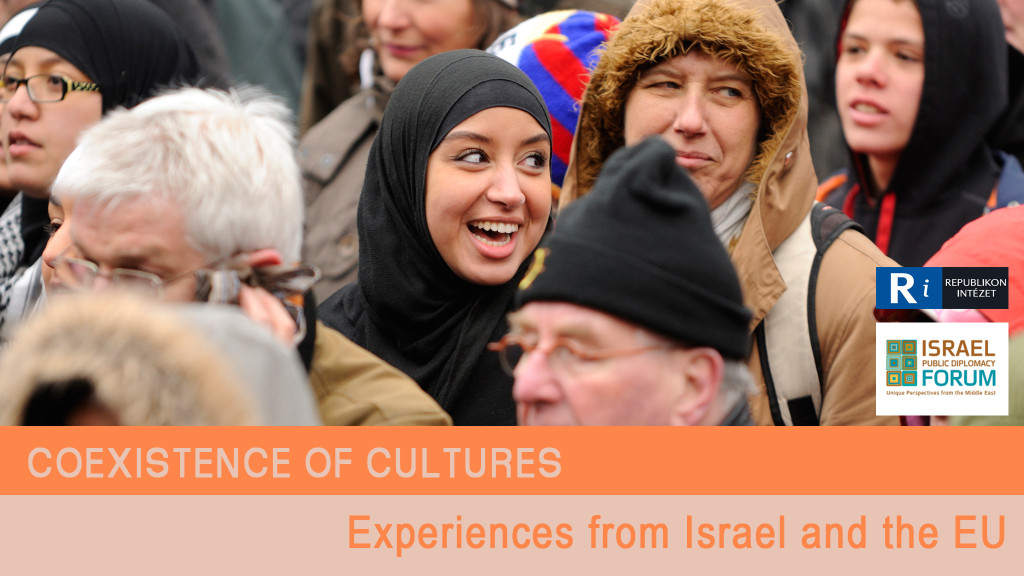“Why would we deny people their cultural background? We have to deal with differences, we have to accept them”
— Márton Bisztrai
Although it has been two years since the outbreak of the refugee crisis, finding the best way to integrate different religious groups into Christian Europe is still on the agenda. This debate is often driven by prejudices, fears, and in some cases government propaganda, mostly in places without large number of immigrants. Consequently, the main theme of a joint conference of the Republikon Instutute and the Israeli Public Diplomacy Forum, which was held on November 15, 2017, was the present state of coexistence of cultures, exchanges of Israeli and European experiences, and the integration of Muslims living in Western European countries.
The conference was moderated by Csaba Tóth, the strategic director at Republikon Institute, Hungary. The speakers were the following: Márton Bisztrai (Anthropologist, Social worker at Menedék Hungarian Associations for Migrants), Máté Szalai (Middle East Program Coordinator of Institute for Foreign Affairs and Trade, assistant professor at BCE), Uriya Shavit (Associate professor in Islamic studies, Chair of Department of Arabic and Islamic Studies, Tel Aviv University, Israel Public Diplomacy Forum), and Bianka Speidl (Senior Researcher at the Migration Research Institute).
 The main topic of the conference was the integration policy in Hungary. “Immigration is an important issue” said Mr Tóth. His first question towards the speakers was about the values of homo- and heterogeneous communities. Mr Shavit answered with another question: “which countries are the happiest ones? Canada and Australia”, the two countries that were actually founded by immigrants. If said immigrants accept the key values of a given country, immigration can be benefical, but not everyone is the same. Mr Shavit introduced a different example: Iceland, a homogenic state, where most of the people come from the same tribe, and the country itself is still considered happy and sucsessfull. Mrs Speidl pointed out that Canada and Australia are among the countries with the strictest immigration policies, and that in Canada, social workers often visit immigrant families to monitor the integration process. She also stated that Hungary is a heterogeneous country, where Jewish minorities accept order, while some members of the Roma community do not. Mr Bisztrai thinks that the sucsess of integration is a matter of perspective. He said that the statement of Prime Minister Orbán regarding the protection of Hungarian ethnic homogenity was a political statement. He also reminded the guests of the holocaust, when the National Socialist Party used genocide as a tool in the process of making Germany a homogenic country. Mr Szalai said, that using the national, ideological, and religious identities of the community can be a tool in mobilization, and can lead to extremism. However, if people accept the laws of the country where they arrive as refugees, they can be benefical to the community.
The main topic of the conference was the integration policy in Hungary. “Immigration is an important issue” said Mr Tóth. His first question towards the speakers was about the values of homo- and heterogeneous communities. Mr Shavit answered with another question: “which countries are the happiest ones? Canada and Australia”, the two countries that were actually founded by immigrants. If said immigrants accept the key values of a given country, immigration can be benefical, but not everyone is the same. Mr Shavit introduced a different example: Iceland, a homogenic state, where most of the people come from the same tribe, and the country itself is still considered happy and sucsessfull. Mrs Speidl pointed out that Canada and Australia are among the countries with the strictest immigration policies, and that in Canada, social workers often visit immigrant families to monitor the integration process. She also stated that Hungary is a heterogeneous country, where Jewish minorities accept order, while some members of the Roma community do not. Mr Bisztrai thinks that the sucsess of integration is a matter of perspective. He said that the statement of Prime Minister Orbán regarding the protection of Hungarian ethnic homogenity was a political statement. He also reminded the guests of the holocaust, when the National Socialist Party used genocide as a tool in the process of making Germany a homogenic country. Mr Szalai said, that using the national, ideological, and religious identities of the community can be a tool in mobilization, and can lead to extremism. However, if people accept the laws of the country where they arrive as refugees, they can be benefical to the community.
The rapporteurs agreed that integration could have many positive outcomes for a country, but there was a split of opinions on whether to distinguish between ethnic and religious groups in terms of integration. “We can integrate anyone if they accept the basic rules and values of the country” answered Mrs Speidl. She think that knowing how to deal with problems during the integration process is a far more important question, since there is a huge difference between integrated and non-integrated people. Mr Szalai said that he would be offended if the state forced unwritten laws on him, since it is not the state’s task to tell people how they should live. Mr Bisztrai thinks integration must be a two-way procedure. We must think about how we can help immigrants. “Why would we deny people their cultural background? We have to deal with differences, we have to accept them” he said.
Immigrants in Europe and Hungary
 “Why should we deny entering a country or accept immigrants?” – asked Mr Tóth. “A welcoming society does not necessarily mean monetary help” – said Márton Bisztrai. He also believes in the importance of the governmental control of immigration. “What is the benchmark of failing to integrate?” asked Urya Shavit. He also talked about the role of christianity in Europe. He asked about Christmas trees being decorated in early November. Ms Speidl thinks immigrants from Arabic countries should not be offended by symbols of other religions, since they make the city multicolored. She also spoke about her own experiences, when she was studying in countries with Islamic majorities, where she followed the rules, and had no conflict with the natives. She also pointed out the fact that even immigrants are different, and the rules of the receiving countries should be made clear to everybody. Mr Bisztrai pointed out the significance of the state propaganda in Hungary, where although most citizens have never even seen an immigrant, yet they think that the immigration crisis is the main threat to Hungarian lifestyle and culture. He also thinks that immigrants should be thaught Hungarian and receive other non-financial support, instead of a small amount of money they recieve when they are granted the refugee status. Mr Szalai thinks that Hungarian people are not more racist than others, but they are certainly less flexible
“Why should we deny entering a country or accept immigrants?” – asked Mr Tóth. “A welcoming society does not necessarily mean monetary help” – said Márton Bisztrai. He also believes in the importance of the governmental control of immigration. “What is the benchmark of failing to integrate?” asked Urya Shavit. He also talked about the role of christianity in Europe. He asked about Christmas trees being decorated in early November. Ms Speidl thinks immigrants from Arabic countries should not be offended by symbols of other religions, since they make the city multicolored. She also spoke about her own experiences, when she was studying in countries with Islamic majorities, where she followed the rules, and had no conflict with the natives. She also pointed out the fact that even immigrants are different, and the rules of the receiving countries should be made clear to everybody. Mr Bisztrai pointed out the significance of the state propaganda in Hungary, where although most citizens have never even seen an immigrant, yet they think that the immigration crisis is the main threat to Hungarian lifestyle and culture. He also thinks that immigrants should be thaught Hungarian and receive other non-financial support, instead of a small amount of money they recieve when they are granted the refugee status. Mr Szalai thinks that Hungarian people are not more racist than others, but they are certainly less flexible
Muslim Minorities
The final question of the conference was specifically about the integration of Muslim minorities. Mr Shavit said that seeing people of Hindu or Sikh religion commiting the same crimes as Muslim minorities is rare and most countries cannot even integrate the immigrants who crossed the border, not to mention the ones waiting to enter the country. Márton Szalai pointed out that even though people of Muslim origins are diverse, the violence sponsored by the governments of Arab countries leads to terrorism. He also pointed out that different generations of refugees react differently to the integration procedures. Older generations do not learn the language as easily as younger ones. They might also experience more difficulties trying to integrate. Speidl spoke about the cultural similarities of Muslim and Christian people, while Bisztrai pointed out that while we have statistics about acts of terror, we do not have any data about the success of integration. Consequently, people only hear about terrorist attacks, instead of positive examples of people of different cultural and religious backgrounds help one another.
Finally, Mr Shavit spoke about the paradox of Muslim youth in Israel. He thinks that by moving into cities with Jewish majorities and studying at universities, Palestinian students can become both more Israeli (since they spend more time with Jewish people and can understand their culture and way of life) and more Muslim (since they can re-evaluate their own cultural and religious heritage) at the same time. The speakers agreed that if people can accept and respect other religions, cultures, lifestyles, and opinions, they can create a colorful and diverse society, which can benefit everyone.



